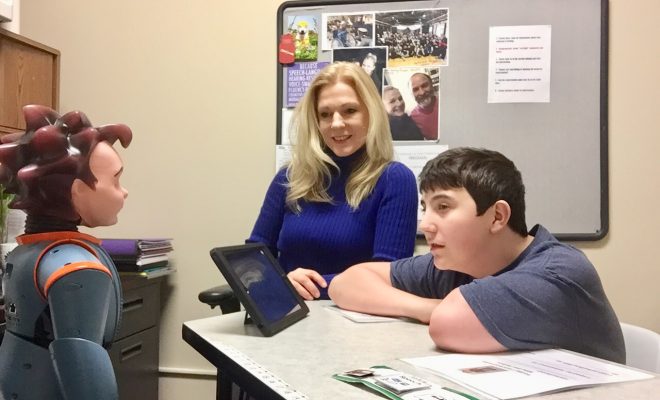Here’s how witnessing violence harms children’s mental health

Daniel J. Flannery, Case Western Reserve University and Mark I. Singer, Case Western Reserve University
Caroline was having a hard time getting her daughter to go to school. The night before, her daughter saw the news about a terrorist bombing that had occurred that day where several children and adults were killed and schools were immediately closed.
Her daughter had a difficult time sleeping and was refusing to eat her breakfast. When Caroline asked her daughter what was wrong, she replied in a hushed tone,
I’m scared mommy. If I go to school, will somebody come in and shoot me? I don’t want to die.”
As researchers and clinicians who have studied the problem of violence over the past three decades, we have witnessed a steady increase in levels of children’s exposure to violence and its damaging effect on their mental health.
How does this exposure to violence affect children and adolescents – especially their mental health? And how should we handle the increased fear and insecurity that results from such events?
Exposure to violence
Today, children use many different forms of media and at unprecedented levels – 92 percent of teens go online daily and 24 percent are online constantly. As a result, children get exposed to violence through multiple media. So, even when violence happens in another part of the world, children are exposed to the event and its consequences immediately, intensely and repeatedly as a result of media exposure.
And there is increasing evidence that exposure to violence in everyday life has a significant impact on children’s mental health.
But then, children today are growing up in a world where fear and insecurity rule over confidence and safety. This is not just driven by media but also by what they experience in the real world.
So, in addition to terrorist acts, children could witness or be victims of violence in many other ways. For example, when we surveyed high school students, between 13 and 45 percent reported they had been beaten up at school. Between 23 and 82 percent said they had witnessed someone else being beaten up at school in the past year.
We have also seen how school shootings with multiple victims have increased in prevalence in the past five years.
Here is what happens to children
Children who report high levels of exposure to violence (either as witness or victim) report the highest levels of depression, anger and anxiety.
Our study with children in grades three to eight who witnessed someone being hit, slapped, or punched found that 12 percent of these children reported levels of anxiety that could require treatment.
Similarly, six months after the September 11, 2001 terrorist attacks, a survey of over 8,000 New York City students in grades four through 12 showed that nearly 30 percent of children reported symptoms of anxiety or depression.

Exposure to violence can have consequences for younger children and adolescents. Samantha Dunne, CC BY-NC-SA
Exposure to violence could have other long-term impacts as well: children could get desensitized to violence and its effects. Studies have shown how children can get desensitized to violence: that is, children can come to believe that violence is an acceptable way to solve problems and that it is without consequence. They could also come to believe that violence could happen anywhere and to anyone at any time.
Further, such children are also at a risk of perpetrating violence against others.
Our studies have shown that children who witness or are victimized by violence are more aggressive toward others. These children also show problematic levels of post-traumatic stress symptoms.
We have consistently found relationships between violence exposure and trauma symptoms, whether we surveyed children in schools, youth in the community or juveniles who were receiving treatment as a result of diversion from the prison system.
Adolescents exposed to high levels of violence reported higher levels of anger and depression. They also reported higher rates of wanting to hurt or kill themselves compared to adolescents in lower violence exposure groups.
Media exposure
More recent studies have confirmed that high exposure to television violence for children and adolescents is also associated with higher levels of aggression and violent behavior. Exposure to violence shown through media is consistently associated with problem behaviors, such as increases in aggression and anxiety. Children could also end up with lower empathy and compassion for others.
Some children exposed to various forms of media violence (not just television violence but violence on the Internet, in movies and in video games) can come to view the world as a mean, scary place where they are not safe and they can do little to protect themselves from harm. This is a particular problem for very young children such as those under the age of six who have difficulty distinguishing reality from fantasy.

Children are being exposed to violence through the various media. Brad Flickinger, CC BY
Exposure to violence could harm the emotional and mental development of young children and adolescents. Children at that age aren’t able to effectively process what they are seeing and hearing. This may be due in part to the fact that chronic exposure to violence can affect parts of their brain.
For adolescents, the front part of their brains is the last to develop and mature. This part of the brain is called the prefrontal cortex, and it is responsible for processing information, impulse control and reasoning. Adolescents exposed to violent video games experience a decrease in activity in their prefrontal cortex, leaving them more vulnerable to having difficulty with problem-solving and controlling their emotions.
What can parents do?
Parents have an important role to play. Knowing where their children are, what they are doing and with whom are some of the best ways to help support children. That improves their ability to cope with what is going on in the world around them.
The same is true for adolescents as well. It is sometimes assumed that as children reach adolescence, they need less support and monitoring as they spend more time with their peers and make increased demands to be more independent.
That is not the case.
Adolescents have more access to social media, to drugs and alcohol, and to transportation. Coupled with this is the growing evidence that the problem-solving and impulse control parts of their brains are not yet fully developed.
Parents are often the first to recognize their children are struggling with mental health and behavioral issues. And they could be the best providers of mental health first aid whenever and however their children need them.
![]()
Daniel J. Flannery, Professor and Director of the Begun Center for Violence Prevention Research and Education, Case Western Reserve University and Mark I. Singer, Professor of Family and Child Welfare, Case Western Reserve University
This article was originally published on The Conversation. Read the original article.




